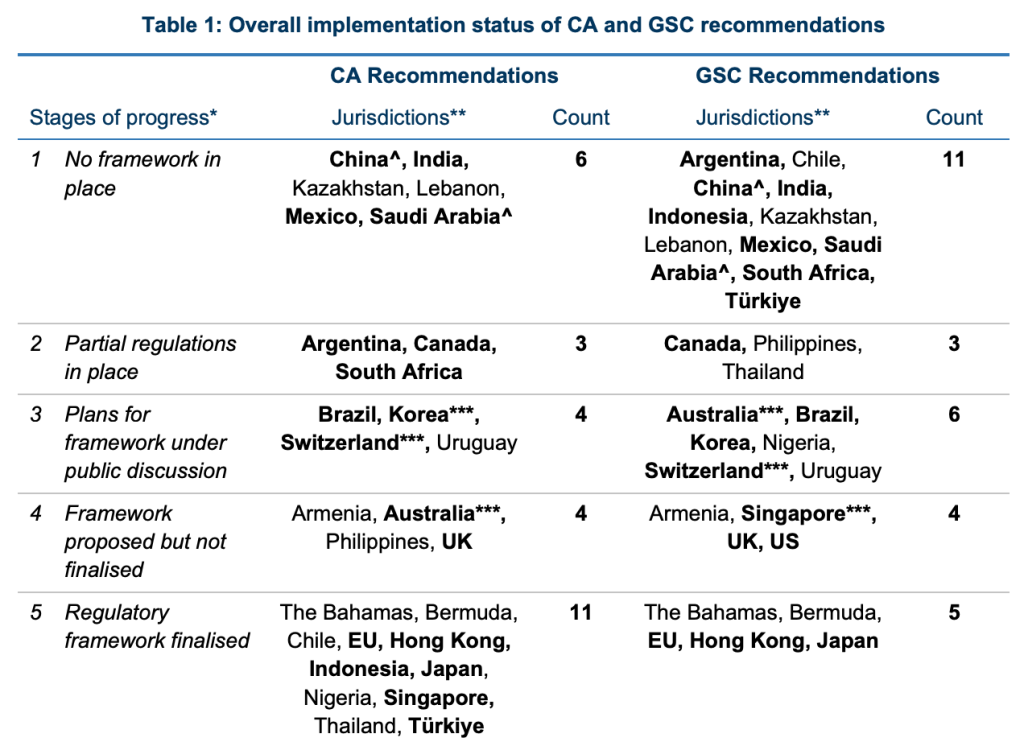The G20’s high monetary watchdog has warned that strict privateness and information safety legal guidelines are hindering international regulators from successfully overseeing the fast-growing cryptocurrency sector.
In an in depth peer assessment report launched on Thursday, the Monetary Stability Board (FSB), a world authority funded by the Financial institution for Worldwide Settlements (BIS), stated inconsistencies in nationwide crypto frameworks are creating main boundaries to cross-border supervision and systemic danger monitoring.
Crypto-asset markets are inherently international, however a number of shortcomings presently stop an efficient and complete oversight by authorities and should delay a coordinated response to potential systemic dangers. Discover out extra: https://t.co/IdgZgErsKF#crypto #stablecoins
— The FSB (@FinStbBoard) October 17, 2025
The FSB’s 107-page assessment outlined persistent gaps in how nations regulate digital belongings akin to Bitcoin and stablecoins.
It famous that divided supervisory obligations, fragmented approaches, and particularly information privateness legal guidelines are complicating information-sharing amongst regulators worldwide.
“Secrecy or information privateness legal guidelines could pose vital boundaries to cooperation,” the FSB wrote, including that in lots of jurisdictions, confidentiality guidelines stop firms from sharing transaction or risk-related information with international regulators.

Lack of Knowledge Entry Leaves Regulators “Blind” to Crypto Dangers, FSB Finds
This, the report stated, “results in delays in addressing cooperation requests” and in some instances “discourages participation in cooperation preparations altogether.”
The board stated privateness protections, whereas important for private and company rights, have develop into a double-edged sword for international oversight. With out constant and dependable information entry, regulators are unable to determine potential systemic dangers within the crypto sector.
The report additionally stated that “regulatory information sources stay restricted,” forcing authorities to depend on incomplete data from industrial suppliers and surveys that usually lack accuracy and consistency.
In keeping with the FSB, the uneven regulatory setting throughout main economies has led to regulatory arbitrage, permitting crypto firms to shift operations throughout borders to take advantage of weaker oversight regimes.
The board urged governments to shut information gaps and strengthen cooperation mechanisms to keep away from additional fragmentation of the worldwide crypto market.
The FSB’s warning comes as privateness debates intensify inside the crypto trade.
Advocates argue that privateness is crucial for safeguarding customers from surveillance and monetary exploitation, whereas regulators view the shortage of transparency as a significant impediment to combating cash laundering and illicit finance.
The stress displays a deeper divide between two monetary philosophies. For governments, information entry is a cornerstone of monetary stability and compliance enforcement.
Privateness is the lacking key to crypto's mass adoption. With out it, main buyers and establishments keep cautious. On this op-ed, @gegelz01 explores why privateness options should lead crypto's evolution.#Crypto #Privacyhttps://t.co/3YAUkh8M0C
— Cryptonews.com (@cryptonews) November 19, 2024
For the crypto group, privateness represents a basic proper and a vital layer of safety in digital finance.
Privateness advocates be aware that transparency on public blockchains can expose individuals and companies to aggressive and safety dangers.
Public pockets information can reveal salaries, commerce volumes, and strategic holdings, data that, in conventional finance, stays strictly confidential.
Consultants say that with out privateness, enterprises and establishments stay hesitant to undertake blockchain for mainstream monetary operations.
Consultants, Particularly Ethereum, Say Lack of Privateness is Crypto’s Greatest Weak point
Latest initiatives inside the Ethereum ecosystem present the trade’s efforts to deal with these privateness issues.
The Ethereum Basis just lately launched a 47-member Privateness Cluster coordinated by Blockscout founder Igor Barinov. The group seeks to develop privacy-preserving applied sciences akin to non-public reads and writes, selective disclosure for digital identities, and a brand new privacy-focused pockets known as Kohaku.
The muse warned earlier this 12 months that with out strong privateness safeguards, Ethereum may danger turning into “the spine of world surveillance fairly than international freedom.”
Ethereum Basis's @PrivacyEthereum rebrands as PSE with a roadmap making privateness the default throughout the technical stack to forestall surveillance dangers.#Ethereum #Privacyhttps://t.co/opTQ6LQaOc
— Cryptonews.com (@cryptonews) September 14, 2025
Ethereum co-founder Vitalik Buterin has additionally been vocal on the difficulty, describing privateness as “important to decentralization.”
In his essay “Why I Assist Privateness,” Buterin argued that data asymmetry, when energy is concentrated amongst those that management information, undermines democratic and monetary stability.
The controversy over crypto privateness has additionally drawn consideration from regulators within the EU, U.S., and U.Ok., the place legal guidelines governing Know Your Buyer (KYC) procedures and the Monetary Motion Process Power’s (FATF) Journey Rule are tightening.
Builders of privateness instruments akin to mixers and zero-knowledge proof techniques have confronted rising scrutiny, with some jurisdictions treating privateness applied sciences as potential instruments for felony exercise.
Regardless of regulatory strain, many inside the crypto trade preserve that privateness and compliance should not mutually unique.
Rising fashions akin to sensible contract privateness enable transactions to stay verifiable with out exposing delicate information, a stability that would fulfill each regulators and establishments.
Finance veteran Petro Golovko, belief protector at British Gold Belief, advised Cryptonews that the shortage of privateness is “crypto’s largest undoing.”
He argued that no financial system can perform if “each transaction is completely public,” saying that with out privateness, crypto “won’t ever scale past a distinct segment.”
The FSB’s report concludes that addressing privateness boundaries will likely be key to supporting efficient cross-border cooperation.
The put up G20 Watchdog Sounds Alarm: Privateness Guidelines Are Handcuffing International Crypto Oversight appeared first on Cryptonews.
